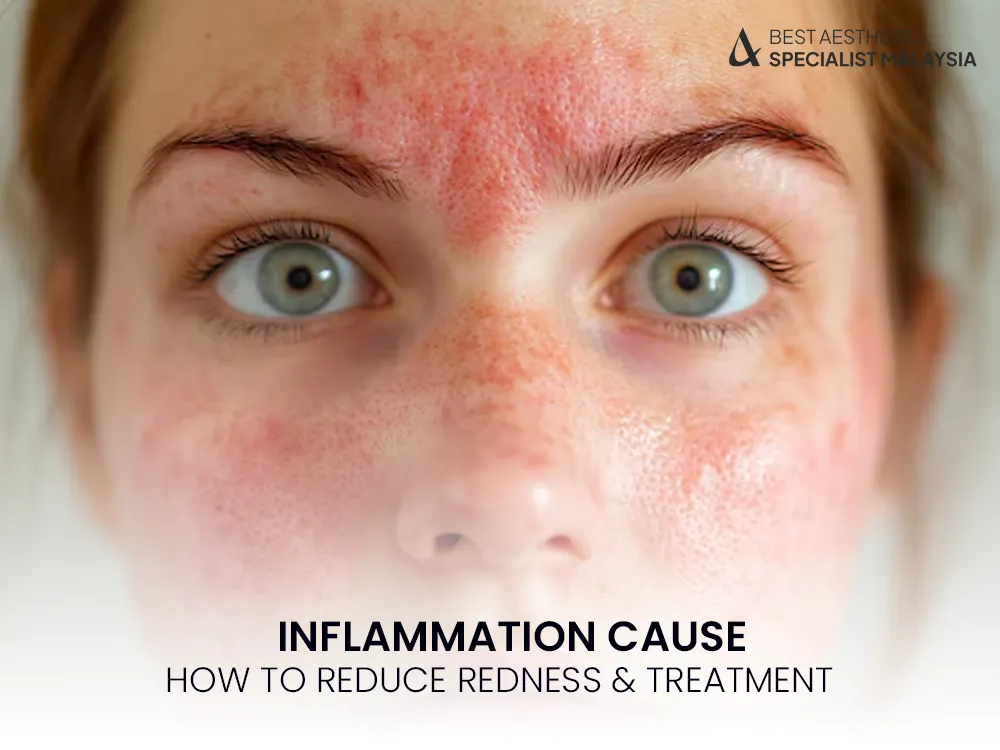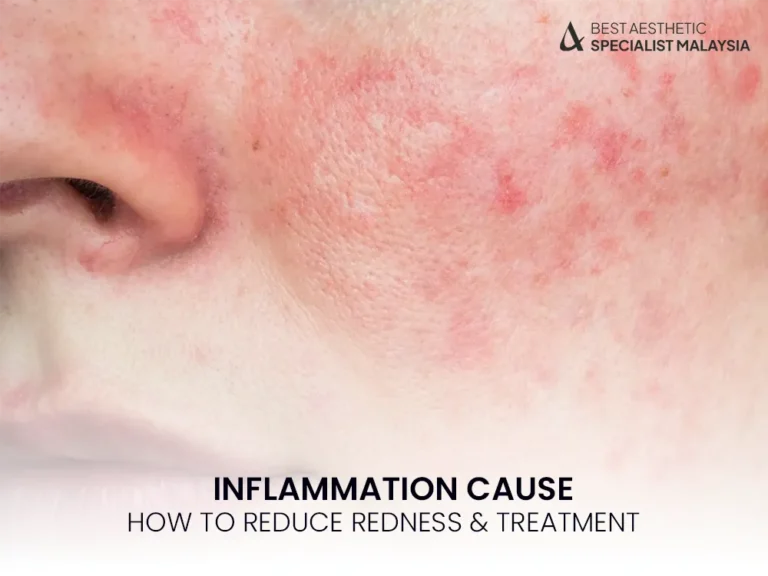Inflammation and Skin
Inflammation is the body’s natural response to injury, infection, or irritants. It is a vital part of the immune system’s defense mechanism, but when it becomes chronic, it can contribute to various health conditions.
What Causes Inflammation?

Inflammation can be classified into two main types: acute and chronic. The causes vary depending on the type and severity of the inflammation.
Acute Inflammation:
Infections: Bacterial, viral, or fungal infections often trigger an inflammatory response as the body fights off pathogens.
Injuries: Physical injuries, such as cuts, bruises, or fractures, lead to localized inflammation.
Allergens: Exposure to allergens can cause inflammatory reactions, such as swelling and redness.
Irritants: Exposure to harmful chemicals, pollutants, or toxins can provoke acute inflammation.
Chronic Inflammation:
Autoimmune Diseases: Conditions like rheumatoid arthritis, lupus, and inflammatory bowel disease (IBD) involve the immune system attacking healthy tissues.
Chronic Infections: Persistent infections, such as hepatitis or tuberculosis, can lead to prolonged inflammation.
Lifestyle Factors: Poor diet, smoking, excessive alcohol consumption, and lack of exercise can contribute to chronic inflammation.
Stress: Chronic stress can exacerbate inflammatory responses.
Treatment Options for Inflammation
The treatment of inflammation depends on its cause and severity. The following approaches are commonly used:
Lifestyle Changes:
Diet: Incorporating anti-inflammatory foods, such as leafy greens, berries, fatty fish, and nuts, can help reduce inflammation.
Exercise: Regular physical activity helps regulate the body’s inflammatory response.
Stress Management: Techniques like meditation, yoga, and deep breathing can lower stress-related inflammation.
Cold and Heat Therapy:
Cold Therapy: Applying ice packs can reduce swelling and pain in acute injuries.
Heat Therapy: Warm compresses improve blood circulation and alleviate stiffness in chronic conditions.
Physical Therapy:
Physical therapy and rehabilitation exercises can help manage inflammation caused by injuries or chronic conditions.
Aesthetic Treatments for Inflammation-Related Issues:
Red Light Therapy: This treatment can reduce inflammation and promote healing in skin-related conditions.
Chemical Peels: For inflammation-related skin discoloration, chemical peels may improve appearance.
Laser Treatments: Conditions like rosacea or post-inflammatory hyperpigmentation can benefit from targeted laser therapy.
Medications for Inflammation
Medications are often prescribed to control inflammation, especially in chronic conditions. Common categories include:
Nonsteroidal Anti-Inflammatory Drugs (NSAIDs):
Examples: Ibuprofen, aspirin, and naproxen.
Uses: Reduce pain, swelling, and fever in conditions like arthritis or injuries.
Corticosteroids:
Examples: Prednisone, hydrocortisone, and dexamethasone.
Uses: Suppress the immune system’s inflammatory response in autoimmune diseases and severe allergies.
Disease-Modifying Antirheumatic Drugs (DMARDs):
Examples: Methotrexate, hydroxychloroquine, and sulfasalazine.
Uses: Slow disease progression in autoimmune conditions like rheumatoid arthritis.
Biologics:
Examples: Adalimumab, etanercept, and infliximab.
Uses: Target specific components of the immune system to reduce inflammation in conditions like psoriasis and Crohn’s disease.
Antihistamines:
Examples: Diphenhydramine, loratadine, and cetirizine.
Uses: Treat inflammation caused by allergic reactions.
Topical Treatments:
Examples: Hydrocortisone creams, diclofenac gels.
Uses: Provide localized relief for skin inflammation and joint pain.
Preventing Inflammation
Preventing inflammation involves maintaining a healthy lifestyle and avoiding known triggers. Key strategies include:
Adopting an anti-inflammatory diet rich in whole, unprocessed foods.
Staying physically active and maintaining a healthy weight.
Avoiding smoking and limiting alcohol intake.
Protecting your skin from irritants and allergens.
Managing stress through mindfulness practices.
FAQs About Inflammation
What are the common signs of inflammation?
Common signs include redness, swelling, heat, pain, and loss of function in the affected area. Systemic inflammation may cause fatigue, fever, and body aches.
Can chronic inflammation lead to serious health problems?
Yes, chronic inflammation is associated with conditions like heart disease, diabetes, cancer, and neurodegenerative disorders.
Are there natural remedies for inflammation?
Yes, natural remedies include turmeric, ginger, omega-3 fatty acids, green tea, and probiotics. These can complement traditional treatments.
How do I know if I have chronic inflammation?
Symptoms like persistent fatigue, joint pain, digestive issues, and frequent infections may indicate chronic inflammation. Consult a healthcare provider for diagnosis.
Is inflammation always bad?
No, acute inflammation is a protective response that promotes healing. Chronic inflammation, however, can be harmful and requires management.
Conclusion
Inflammation is a complex yet essential process that helps the body heal and protect itself. Understanding its causes, treatment options, and the role of medication is crucial for managing both acute and chronic inflammation effectively. In certain cases, aesthetic treatments may provide relief or address inflammation-related skin concerns. By adopting a proactive approach to prevention and seeking professional advice when necessary, you can mitigate the negative impacts of inflammation on your health and quality of life.

